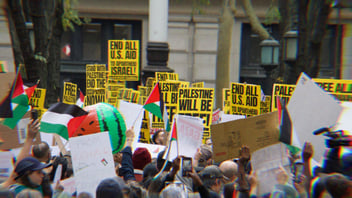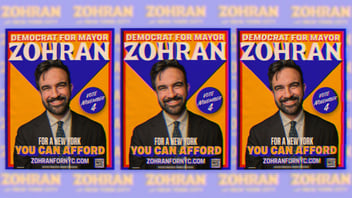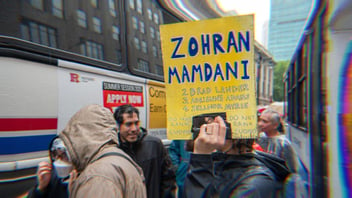The Debate Stage Moment That Propelled Mamdani
 Image Description: Zohran speaking to a group of DSA members.
Image Description: Zohran speaking to a group of DSA members.
This essay appeared in the Nov. 6, 2025 edition of UNFTR’s premium newsletter. Become a UNFTR member to receive our bonus newsletter each week and for other perks.
For as much as New York City Mayor-Elect Zohran Mamdani tried to make his insurgent campaign exclusively about the affordability crisis in America’s largest metropolis, there’s little denying the impact one line—unrelated to his core campaign themes—had on the eventual outcome of one of the biggest mayoral races of our time.
“I believe that you need not travel to Israel to stand up for Jewish New Yorkers,” Mamdani said during a critical June Democratic primary debate when asked if he’d make a trip to Israel as mayor.
Mamdani’s response—which his rivals on stage seemingly presumed would serve as a death knell—became yet another viral moment in a campaign full of them. His answer, amid the Israeli genocide of Palestinians, struck a nerve on all sides. Staunch and unapologetic Israel defenders castigated him as an anti-Semite simply for saying he wants to stay in the city he’d hoped to govern, while his supporters, many of whom share his criticism of the Netanyahu government, were profoundly grateful.
For years, Americans have effectively been silenced when it comes to Israel-Palestine discussions. When Americans attempted to organize boycott movements (BDS) against corporations that did business with Israel, anti-BDS blacklists were created—including in New York under the leadership of then-Gov. Andrew Cuomo, the political scion who most recently trafficked in vile and grotesque attacks against Mamdani, who will be the first Muslim mayor of the Big Apple. Even for reporters like myself trying to bring such issues to light, those participating in such boycotts, including professors and university students, were hesitant—afraid, even—of speaking out publicly, concerned about the personal repercussions and consequences to their professional lives. Many of these BDS organizers were Jewish themselves.
The erasure of the Palestinian struggle through crackdowns on speech and political action helped produce the conditions for people in Gaza and the West Bank to be dehumanized, creating a permission structure for abuses to come their way.
Whether it was speaking out on indiscriminate bombings in Gaza, the intentional shootings of protesters on the Gaza-Israel border, or characterizing Gaza as the world’s largest “open-air prison,” Palestine supporters were cast aside as ignorant extremists. For its part, the corporate media largely ignored Palestinians altogether. An analysis by the Tel Aviv-based +972 magazine found that of the opinion pieces about Palestinians in the New York Times from 1970–2019, only 1.8% were written by Palestinians. The lack of Palestinian perspective was similarly found in the Washington Post and The New Republic, considered an authoritative source for the elite liberal class.
Not only have years of manufactured silence had serious implications for people’s understanding of the decades-long struggle, but they directly contributed to the Israeli government’s genocidal behavior over the last two years. On the regional level, this silence also granted other Arab nations the freedom to negotiate ostensible “peace” agreements with Israel that, in reality, serve as arms deals, such as the much-ballyhooed Trump-era Abraham Accords, which effectively ignored the question of Palestinian statehood.
That Mamdani’s hard “no” on taking a trip to Israel generated its own news cycle and, more broadly, undergirded the most ferocious and Islamophobic attacks against him, shouldn’t have been surprising.
Mamdani did something no other candidate, let alone a Democrat vying for such an influential and challenging position, had ever even considered.
As the excellent New York City-based journalist Ross Barkan wrote the day after Mamdani’s mayoral victory:
“No discussion of Mamdani is complete without acknowledging that his candidacy, as recently as a decade ago, would have been considered taboo in both New York and national political circles. In the 2010s, only Israel hawks had a voice in the Democratic Party, and it was verboten to speak on the suffering in Gaza or the West Bank. Supporting BDS, as Mamdani does, was unheard of for almost any elected official, and even Democrats who self-identified as progressives, like Mayor Bill de Blasio, were fiercely pro-Israel.”
In the context of years of manufacturing consent through manufactured silence, it’s more than possible that Mamdani galvanized entire groups of voters whose political views, long suppressed, felt seen. To them, they had someone who gave voice to the self-contained pain they’d experienced for years as they watched injustice after injustice leveled at Palestinians, all of which their government was complicit in. (Then came the genocide in Gaza, which has effectively been livestreamed for all to see, with images of crushed bodies, bloodied and slaughtered children dominating people’s news feeds. When college protesters attempted to speak out, the state used local police to crack down on demonstrations, students were doxxed to damage their career prospects, and the Trump administration began arresting legal immigrants who were critical of Israel’s indiscriminate killings, which prompted a genocide case at the International Court of Justice. Among those swept off the streets and detained was Rümeysa Öztürk, a Turkish PhD student studying at Tufts University, who committed the apparent crime of co-writing a tepid Op-Ed in the student newspaper.)
After the June 4 debate in which Mamdani’s remarks ricocheted across the political world, the charismatic state assemblyman began to rocket up the polls. According to a collection of surveys tracked by the New York Times, Mamdani overcame seemingly insurmountable double-digit leads by Cuomo (ranging from +12 to +32) before ultimately defeating the former governor (and aspiring king) and other challengers, including the incumbent, Eric Adams, in the Democratic primary.
That debate stage moment could very well be remembered as the turning point in the race—and Mamdani and Cuomo’s political careers. Remember, it was Mamdani himself who interviewed voters after the November presidential election, many of whom told him they picked Donald Trump over Kamala Harris because he promised to end the war in Gaza. The genocide—and the inability to stop it—became a top issue for many Americans, including 29% of 2020 Joe Biden voters who pulled the lever for someone other than Harris in 2024. In critical battleground states, 20% pointed to Gaza as the most important factor in their vote, including 32% in both Michigan and Wisconsin, 38% in Arizona, and 19% in Pennsylvania.
Mamdani didn’t single-handedly reshape New York City politics as much as embrace what was boiling up from within—outrage over deepening income inequality, anger over civil liberties being eroded because they disagreed with another country’s government, and a general sense that the working class has not only been ignored but forgotten. For his part, Cuomo leaned into the fear-mongering and anti-Muslim hysteria in the waning days of the campaign, yet it didn’t save him from losing to Mamdani for the second time in five months.
In his victory speech, Mamdani celebrated the campaign’s toppling of a political dynasty, referring to Cuomo.
Mamdani did more than take a cudgel to the politics of nepotism—he helped spur a “New Age,” as Barkan dubbed it, of politics altogether.
Image Source
- Bingjiefu He, CC BY-SA 4.0, via Wikimedia Commons. Changes were made.
Rashed Mian is the managing editor of the award-winning News Beat podcast and co-founder of the newly launched Free The Press (FTP) Substack newsletter. Throughout his career, he has reported on a wide range of issues, with a particular focus on civil liberties, systemic injustice and U.S. hegemony. You can find Rashed on X @rashedmian and on Bluesky @rashedmian.bsky.social.


